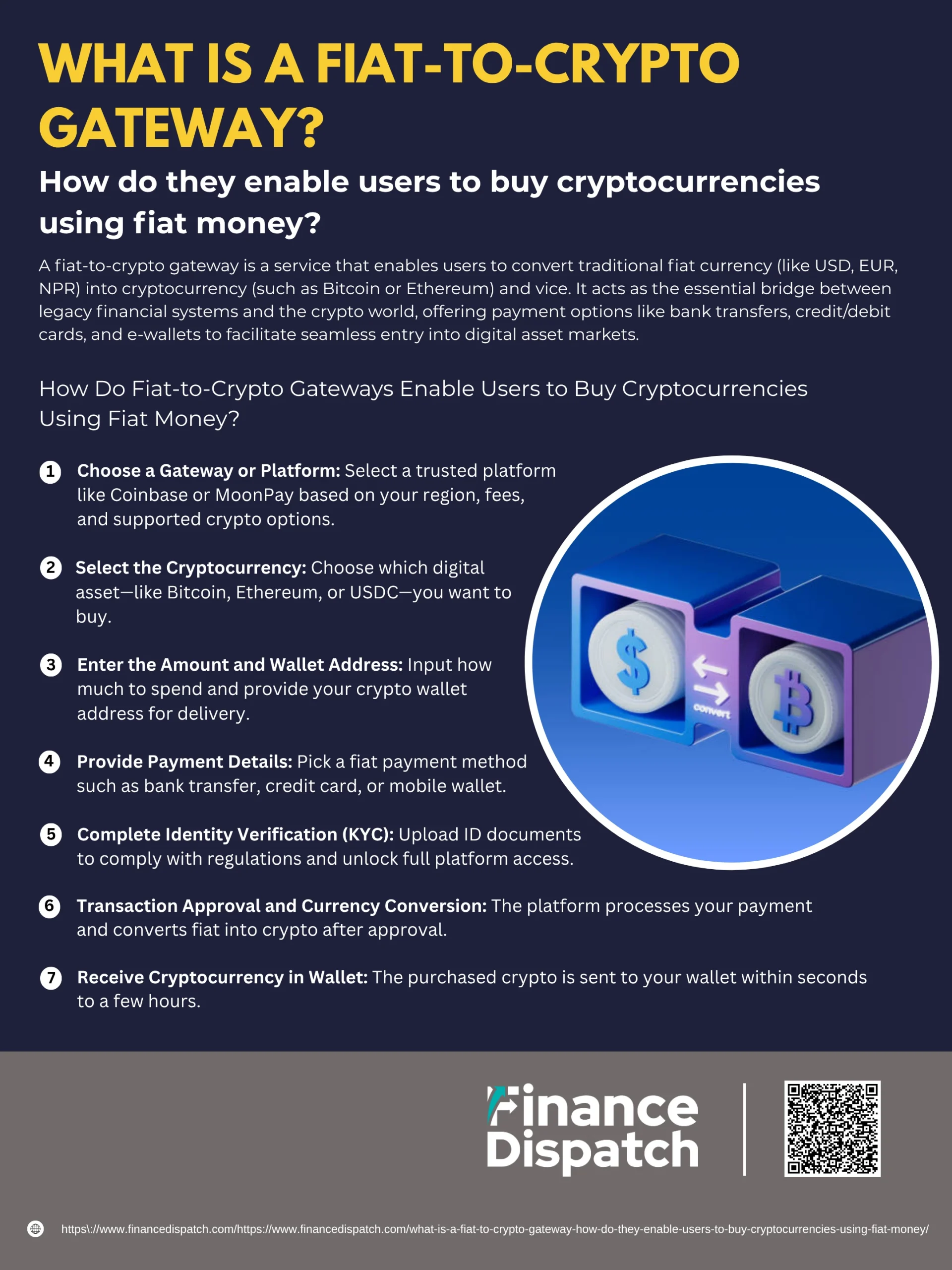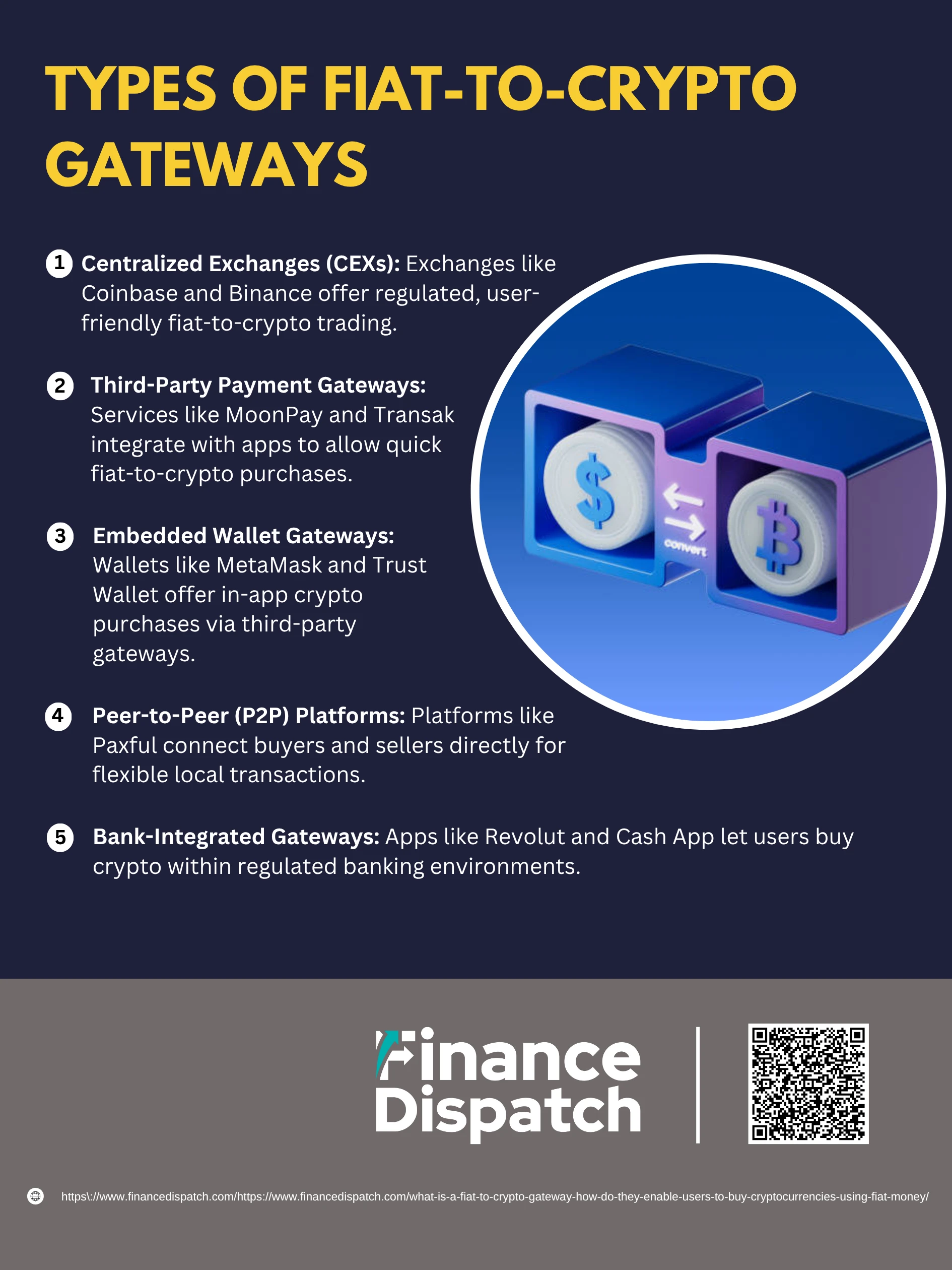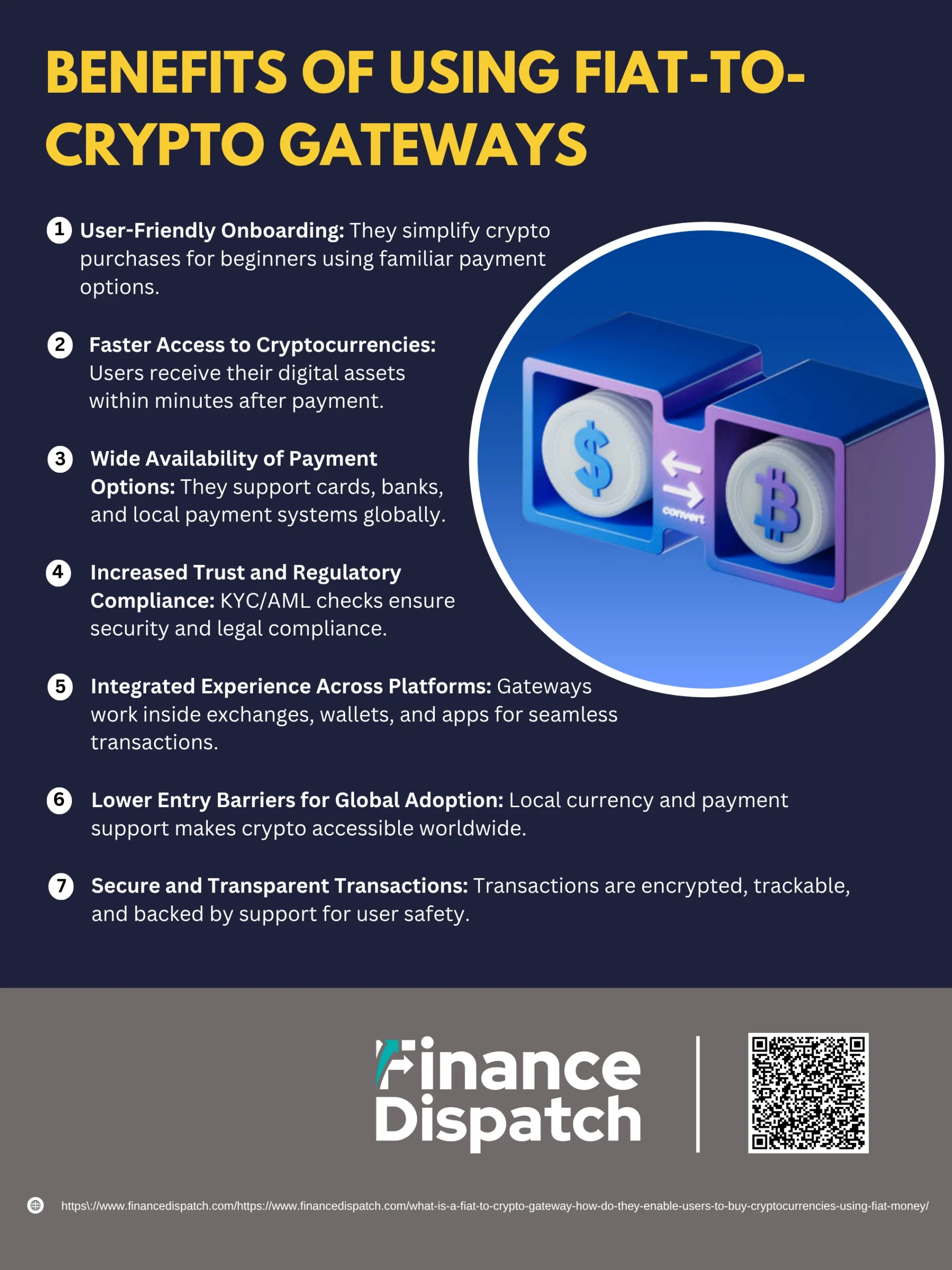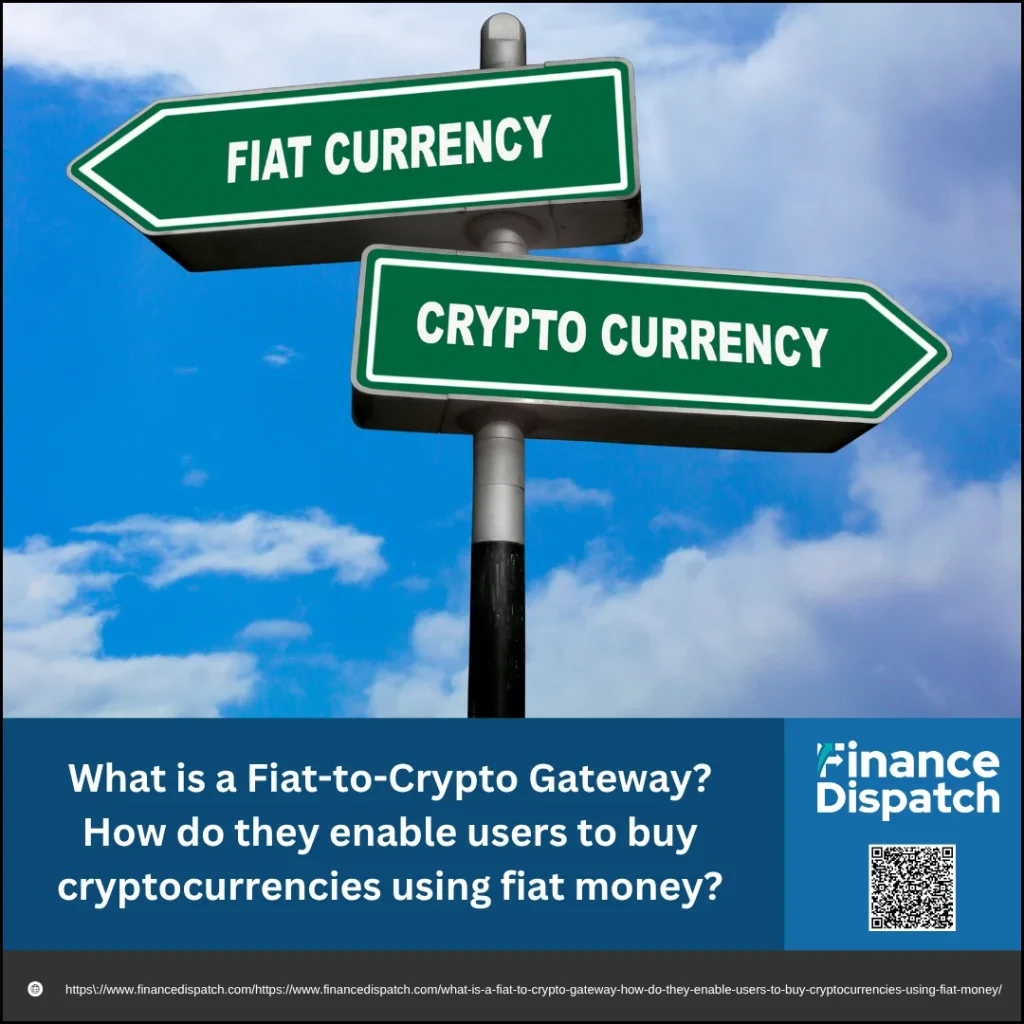In the ever-evolving world of digital finance, fiat-to-crypto gateways play a crucial role in connecting traditional money systems with the realm of cryptocurrencies. These platforms allow users to seamlessly convert fiat currencies—such as USD, EUR, or GBP—into digital assets like Bitcoin, Ethereum, or stablecoins. For newcomers and seasoned investors alike, fiat-to-crypto gateways serve as the primary entry point into the crypto market, offering a secure and user-friendly way to purchase cryptocurrencies using familiar payment methods like credit cards, bank transfers, and digital wallets.
What is a Fiat-to-Crypto Gateway?
A fiat-to-crypto gateway is a financial service or platform that enables users to purchase cryptocurrencies using traditional fiat currencies, such as US dollars, euros, or yen. These gateways act as bridges between the conventional banking system and the decentralized world of digital assets, making it easier for individuals to enter the cryptocurrency market. By supporting common payment methods—like credit cards, bank transfers, or mobile payment apps—fiat-to-crypto gateways simplify the process of acquiring crypto, eliminating the need for prior crypto ownership or complex trading knowledge. They are often integrated into exchanges, wallets, and third-party apps to offer a smooth and accessible user experience.
 How Do Fiat-to-Crypto Gateways Enable Users to Buy Cryptocurrencies Using Fiat Money?
How Do Fiat-to-Crypto Gateways Enable Users to Buy Cryptocurrencies Using Fiat Money?
Fiat-to-crypto gateways make it possible for everyday users to transition from traditional currencies to digital assets with ease. By integrating familiar payment methods and streamlined interfaces, these gateways remove many of the technical barriers associated with cryptocurrency adoption. Here’s how the process typically works:
1. Choose a Gateway or Platform
Users start by selecting a reliable fiat-to-crypto gateway, which could be an exchange like Coinbase or Binance, or a third-party service like MoonPay or Transak. These platforms differ in terms of supported countries, fees, and available cryptocurrencies.
2. Select the Cryptocurrency
After choosing the platform, users select the specific cryptocurrency they want to buy—such as Bitcoin (BTC), Ethereum (ETH), or a stablecoin like USDC. Most platforms offer a wide range of crypto assets.
3. Enter the Amount and Wallet Address
Users specify how much fiat currency they want to spend or how much crypto they want to receive. They also need to input a valid cryptocurrency wallet address where the purchased coins will be sent—unless the platform offers a custodial wallet.
4. Provide Payment Details
Next, users choose a fiat payment method. Common options include credit cards, debit cards, bank transfers, Apple Pay, Google Pay, or even regional methods like UPI in India or SEPA in Europe.
5. Complete Identity Verification (KYC)
Most regulated platforms require users to verify their identity by uploading a government-issued ID and sometimes a selfie. This step ensures compliance with anti-money laundering (AML) laws.
6. Transaction Approval and Currency Conversion
Once identity is verified, the platform approves the transaction. The fiat payment is processed and automatically converted into the selected cryptocurrency at the current exchange rate, minus any applicable fees.
7. Receive Cryptocurrency in Wallet
After successful conversion, the crypto is transferred to the user’s wallet. This can happen within seconds or take a few minutes to hours, depending on network congestion and platform efficiency.
 Types of Fiat-to-Crypto Gateways
Types of Fiat-to-Crypto Gateways
Fiat-to-crypto gateways come in various forms, each tailored to different user needs, levels of technical experience, and regional availability. Some are built into popular crypto exchanges, while others function as independent services or integrations within wallets and apps. Understanding the different types of gateways can help users choose the most suitable option for buying cryptocurrencies using fiat money. Below are the main types of fiat-to-crypto gateways:
1. Centralized Exchanges (CEXs)
Platforms like Coinbase, Binance, and Kraken offer built-in fiat-to-crypto services. These exchanges allow users to deposit fiat via cards or bank transfers and trade it for cryptocurrencies. They are known for user-friendly interfaces, high liquidity, and compliance with regulatory standards.
2. Third-Party Payment Gateways
Services such as MoonPay, Transak, and Ramp act as intermediaries between users and blockchain platforms. They integrate with wallets, exchanges, or dApps, enabling fiat purchases through APIs or SDKs. These gateways focus on ease of integration and fast transactions.
3. Embedded Wallet Gateways
Wallet apps like Trust Wallet, MetaMask, or Exodus often partner with third-party gateways (e.g., MoonPay, Wyre) to provide in-app fiat purchases. Users can buy crypto directly inside their wallets without switching platforms.
4. Peer-to-Peer (P2P) Platforms
Gateways such as Paxful or Binance P2P allow users to buy crypto directly from other users using local fiat payment methods. These platforms often support a wide range of currencies and offer more flexibility, but require caution and user verification.
5. Bank-Integrated Gateways
Some financial institutions or fintech platforms, like Revolut or Cash App, offer direct fiat-to-crypto services within their apps. These are regulated environments and are ideal for users who prefer all-in-one financial solutions.
Key Features to Look For in a Fiat Gateway
When choosing a fiat-to-crypto gateway, it’s important to evaluate more than just the ability to convert traditional money into digital assets. The right gateway can offer convenience, security, cost-effectiveness, and regulatory peace of mind. Whether you’re a first-time buyer or a regular investor, understanding the key features to look for can help ensure a smooth and trustworthy experience. Here are the essential features to consider:
1. Regulatory Compliance and KYC
Ensure the platform follows legal standards and implements Know Your Customer (KYC) verification to protect against fraud and money laundering.
2. Supported Fiat Currencies
Check whether the gateway supports your local currency, such as USD, EUR, INR, or others, to avoid unnecessary conversion fees.
3. Range of Cryptocurrencies
Look for platforms that offer access to a wide variety of cryptocurrencies—beyond just Bitcoin and Ethereum—such as stablecoins and altcoins.
4. Transaction Fees
Compare the fees for card payments, bank transfers, and currency conversion. Some gateways charge flat fees, while others use a percentage model.
5. Payment Method Flexibility
A good gateway should support multiple payment methods, including credit/debit cards, bank transfers, Apple Pay, Google Pay, or local options like UPI or SEPA.
6. Speed of Transactions
Consider how long it takes for the purchased cryptocurrency to appear in your wallet. Some platforms offer near-instant delivery, while others may take hours.
7. Security Measures
Choose gateways that offer two-factor authentication (2FA), encryption, and secure handling of both fiat and crypto transactions.
8. User Interface and Experience
A clean, intuitive interface makes it easier for users—especially beginners—to complete purchases confidently and without confusion.
9. Customer Support
Responsive support can be critical when issues arise. Look for platforms with live chat, email support, and clear help documentation.
10. Integration Options (for Developers/Businesses)
If you’re building an app or service, ensure the gateway offers robust API or SDK integration for seamless fiat-to-crypto transactions within your platform.
 Benefits of Using Fiat-to-Crypto Gateways
Benefits of Using Fiat-to-Crypto Gateways
Fiat-to-crypto gateways have become essential tools for making cryptocurrency accessible to mainstream users. These platforms simplify the process of buying digital assets with traditional money, removing technical barriers and providing a familiar experience for those new to the crypto space. Whether integrated into exchanges, wallets, or apps, fiat gateways help accelerate crypto adoption worldwide. Here are the key benefits of using fiat-to-crypto gateways:
1. User-Friendly Onboarding
Gateways make it easy for beginners to enter the crypto market using familiar payment methods like credit cards or bank transfers, without needing prior blockchain knowledge.
2. Faster Access to Cryptocurrencies
These platforms offer near-instant crypto purchases, allowing users to buy and receive digital assets within minutes instead of navigating lengthy peer-to-peer processes.
3. Wide Availability of Payment Options
From debit/credit cards to digital wallets and local banking systems, gateways support various fiat payment methods, catering to users across different regions.
4. Increased Trust and Regulatory Compliance
Most fiat gateways are licensed and regulated, offering KYC (Know Your Customer) and AML (Anti-Money Laundering) procedures that provide users with added security and transparency.
5. Integrated Experience Across Platforms
Many gateways are embedded directly within wallets, exchanges, and decentralized applications, enabling seamless crypto purchases without switching services.
6. Lower Entry Barriers for Global Adoption
By supporting local fiat currencies and regional payment systems, gateways empower users in underserved markets to participate in the global crypto economy.
7. Secure and Transparent Transactions
Gateways typically offer encrypted payment processing, real-time transaction tracking, and reliable customer support, making the purchase experience safer for users.
Challenges and Risks of Fiat-to-Crypto Gateways
Fiat-to-crypto gateways offer a convenient bridge between traditional finance and the digital asset world, but they are not without their challenges. While these platforms simplify access to cryptocurrencies, users should be aware of the potential risks involved. From regulatory hurdles to transaction delays, understanding these drawbacks is essential for making informed decisions when choosing a fiat gateway.
1. High Transaction Fees
Many fiat gateways charge significant fees for processing payments and converting currencies, especially when using credit cards or third-party services.
2. Regulatory Restrictions
Legal frameworks around cryptocurrency vary widely by country. Some gateways may be unavailable in certain regions or may require extensive identity verification.
3. Limited Fiat and Crypto Support
Not all platforms support a broad range of fiat currencies or cryptocurrencies, which can restrict your buying options or lead to unfavorable exchange rates.
4. Security Concerns
While most gateways are secure, there’s always a risk of data breaches, phishing attacks, or poor platform security leading to potential loss of funds or personal information.
5. Slow Processing Times
Depending on the payment method or verification process, transactions can sometimes take hours or even days to complete, especially during peak demand.
6. Privacy Trade-offs
To comply with KYC/AML regulations, users are required to submit personal identification documents, which may deter privacy-conscious individuals.
7. Risk of Scams or Unreliable Services
Not all fiat-to-crypto gateways are trustworthy. Users must be cautious of fake platforms or those with poor reputations and lack of regulatory oversight.
8. Currency Volatility During Conversion
The time it takes to process a fiat payment can expose users to crypto market volatility, resulting in a different amount of crypto received than expected.
Popular Fiat-to-Crypto Gateway Providers
As the demand for seamless crypto purchasing experiences grows, numerous fiat-to-crypto gateway providers have emerged to serve users around the world. These platforms vary in terms of supported currencies, fees, integration capabilities, and user interfaces. Whether you’re a beginner looking for simplicity or a developer seeking integration tools, choosing the right provider is key to a smooth transaction process. Below is a comparison of some of the most popular fiat-to-crypto gateway providers:
| Provider | Platform Type | Payment Methods | Supported Fiat Currencies | Key Features |
| Coinbase | Centralized Exchange | Credit Card, Bank Transfer | USD, EUR, GBP | Beginner-friendly, highly regulated |
| Binance | Centralized Exchange + P2P | Bank Transfer, Card, P2P | 50+ fiat currencies | Low fees, global access, wide crypto selection |
| MoonPay | Third-Party Payment API | Credit Card, Apple Pay, Google Pay | 40+ fiat currencies | Easily integrated into apps and wallets |
| Transak | API/SDK-based Gateway | Bank Transfer, Card, UPI | 100+ countries | Popular in DeFi apps, supports local methods |
| Ramp | Non-custodial Gateway | Bank Transfer, Card | USD, EUR, GBP, others | Compliance-focused, used in Web3 integrations |
| Paxful | Peer-to-Peer Platform | Bank, Gift Cards, Online Wallets | 300+ payment options | High flexibility, strong presence in emerging markets |
| Kraken | Centralized Exchange | Bank Transfer, Wire Transfer | USD, EUR, CAD, JPY | Strong security, institutional-grade features |
The Future of Fiat-to-Crypto Gateways
The future of fiat-to-crypto gateways is poised for significant transformation as the cryptocurrency landscape continues to mature. Advancements in financial technology, regulatory frameworks, and blockchain integration are driving these platforms toward faster, more secure, and more accessible services. We can expect to see greater support for real-time payments, integration with Central Bank Digital Currencies (CBDCs), and enhanced identity verification using decentralized digital IDs. Additionally, as global demand for digital assets rises, fiat gateways will likely expand to underserved regions, support more local currencies, and offer lower fees through improved infrastructure. These developments will make crypto more inclusive and further bridge the gap between traditional finance and decentralized systems.
Conclusion
Fiat-to-crypto gateways play a vital role in making cryptocurrencies accessible to the general public by bridging the gap between traditional financial systems and the digital asset economy. They simplify the process of purchasing crypto with familiar fiat currencies, offering user-friendly platforms, secure transactions, and broad payment options. While they come with certain challenges and risks, their benefits—especially for newcomers—are undeniable. As the industry evolves, these gateways will continue to improve in efficiency, security, and global reach, serving as key enablers in the widespread adoption of cryptocurrency. Choosing the right gateway can significantly enhance your crypto journey, ensuring a smooth and secure entry into the decentralized world.



